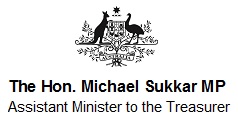
Confused Leigh’s own words come back to bite him
Andrew Leigh is repeating his misrepresentation of Australia’s corporate tax rate to defend his backflip on now opposing a cut to the corporate tax rate he once supported.
Yesterday and again today, the Shadow Assistant Treasurer tried to incorrectly claim that we don’t need to reduce the 30% corporate tax rate because somehow the corporate tax rate is actually akin to a 20% rate:
“What Australians have to recognise is that our corporate rate has dividend imputation. That means we take a third of the company tax revenue and we give it back. So a corporate tax rate of 30 per cent with imputation raises as much as a rate of 20 per cent without imputation.”
Leading tax professionals throughout Australia have expressed alarm at this misrepresentation, or even worse, concern that the Shadow Assistant Treasurer is genuinely confused about such a fundamental part of Australia’s tax system.
Firstly, we do have a dividend imputation system in Australia that was introduced by Labor in the 1980s to avoid double taxation. Double taxation occurs when the company pays 30% on profits and the shareholder pays tax again at their full marginal rate on the dividend.
Secondly, the corporate tax rate is currently 30%.
Yet again, Andrew Leigh’s own words come back to haunt him, when he wrote in 2010;
“One key feature is the extent to which there is an imputation system, under which part of any corporation tax paid is treated as a pre-payment of personal income tax.”
Dividend imputation does not reduce the corporate tax rate.
Dividend imputation does not reduce the tax paid by corporate entities.
Dividends are paid from after tax profits and the corporate tax rate is 30% not 20%.
Let’s take the example of a company generates $100 in profit and pays $30 in tax at the 30% rate.
This leaves the company with $70 profit after tax and if it pays $70 of that to shareholders as a dividend.
When the shareholder receives the $70 dividend they are also entitled to the $30 franking credits at the ATO. Therefore the total assessable income or grossed up dividend is $100.
The shareholders marginal tax rate will determine if they have to pay the ATO additional tax or potentially receive franking credits back as a tax refund.
But the corporate tax paid by the company in this example remains at 30%.
According to Treasury:
Under imputation, company tax acts as a withholding tax on Australian shareholders by collecting some of the tax that would be paid by the shareholder when they receive a dividend. Australian shareholders then receive a credit against their tax liability for the tax paid by the company.
Further, while Australian shareholders can claim franking credits, company tax is a final tax on foreign shareholders. Foreign shareholders face the 30% tax rate, which is high by international standards.
Lowering the corporate tax rate will make more business investment opportunities viable. It is the 30% company tax rate that matters for foreign investment as they cannot use franking credits.
No amount of obfuscation or confused justifications from Andrew Leigh can cover for the fact that, he now opposes a cut to the corporate tax rate he once strongly supported and argued for.
Media contact: Joshua Bonney (03) 9874 1711
